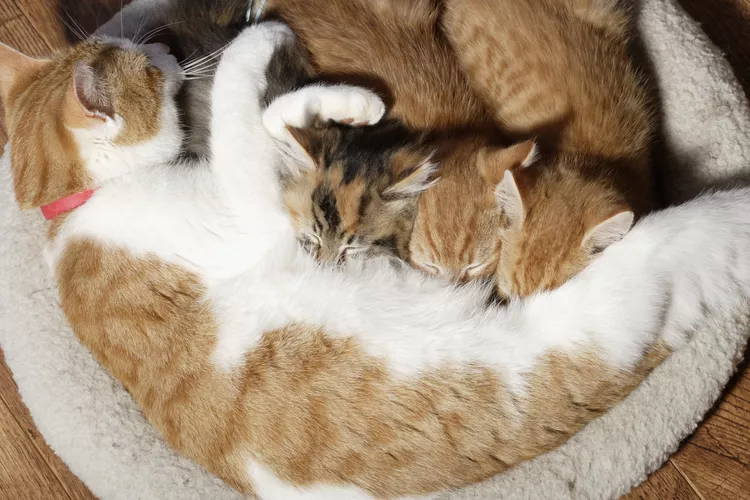How Long Should Kittens Stay With Their Mothers?

Kittens should stay with their mothers for 12 to 13 weeks of age for them to be properly developed physically and behaviorally. Each kitten needs to be weaned before being placed in a new home because many necessary nutrients come from the mother cat's milk. If they are weaned too soon, it could lead to the risk of future health issues or more veterinary visits.
Staying with their mother for 12-13 weeks will help kittens receive the necessary nutrients to healthily and fully develop. This also allows the mother to begin socializing the kittens. The extra time will allow them to play and communicate with their littermates, so they can easily adapt to their new home situation once adopted or purchased.
How Long Do Kittens Nurse?
Mother cats will typically start to wean their kittens off their milk around one month of age. This does not, however, mean that this is the time that the kittens can go home. The next month of life is still full of essentials for a growing kitten, even if they aren't consuming their mother's milk all of the time.
The weaning process usually continues for about another month until the kittens are fully weaned between eight and 10 weeks of age. During this time, the kittens will still occasionally nurse on their mother, but they will also start to eat liquid kitten food. Gradually transition kittens to watered-down canned kitten food or moistened kitten kibble over the four- to six-week weaning period. You'll notice the kitten consuming less and less milk from the mother and eating more kitten food. However, getting a kitten used to eating dry food can take some time, so it should not be forced or rushed.
What To Do If There's No Mother Cat
If the mother cat perhaps did not survive the birth, was not healthy enough to care for kittens, got hit by a car, or if a litter of kittens was abandoned at a shelter, the kittens can still get the necessary nutrition they need and lead a healthy life with the help of humans. Some shelters will use a foster lactating cat to both nurse the kittens and socialize them or bottle feed the kittens with store-bought kitten milk replacement formula or homemade formula.
Bottle-fed kittens do not receive the same care from humans as they would from a cat. Cats teach their young important skills that we cannot duplicate as humans. Bottle-fed kittens are a huge time commitment, so if you are adopting a young bottle-fed kitten who has no mother cat, be prepared to feed, stimulate them to potty, and clean them often.
What Happens When Kittens Leave Their Mother Too Soon?
If a kitten is taken from his mother and sent to a new home too soon, there can be some serious health consequences.
Growth and Development Issues
The first few weeks of a kitten's life are essential for health and body development. The colostrum and nutrients in the mother's milk are responsible for strong bone development, eye health, and full organ development, so if a kitten is weaned too soon, you could be increasing the risk of your cat developing more health issues later on. A kitten removed from the mother too soon may need nutritional supplementation and other veterinary care early on in life.
Behavioral Issues
In addition to health concerns, behavioral issues can arise in kittens who were removed from their mothers too early in life. Mother cats teach their kittens' lifelong lessons and give off calming pheromones. Kittens who left their mothers too soon may have trouble grooming themselves, not know how to bury their waste in the litter box, play too rough, not know how to hunt for food, or have other behavioral problems.
Problems Adjusting to Life with Humans
A kitten that is removed from its mother too soon may also have trouble adjusting to a new home and family. Growing up with a mother and littermates is an essential part of cat socialization. Without proper socialization at a young age, the kitten may grow up to be fearful, skittish, or even aggressive. The kitten also may not know how to properly communicate with other cats. You will need to spend significant amounts of time working with a kitten that did not spend adequate time with its mother and littermates. This will help them adapt to their new home and learn appropriate behaviors.
The Ideal Age to Adopt a Kitten
Ideally, kittens should go to their new home around 12 weeks of age. While some kittens can go home earlier, the closer you wait until 12 or 13 weeks, the better off the kitten will be. Your cat's chances of being healthy, well-socialized, and properly developed are dramatically increased by allowing them to spend extra time with the mother and littermates.